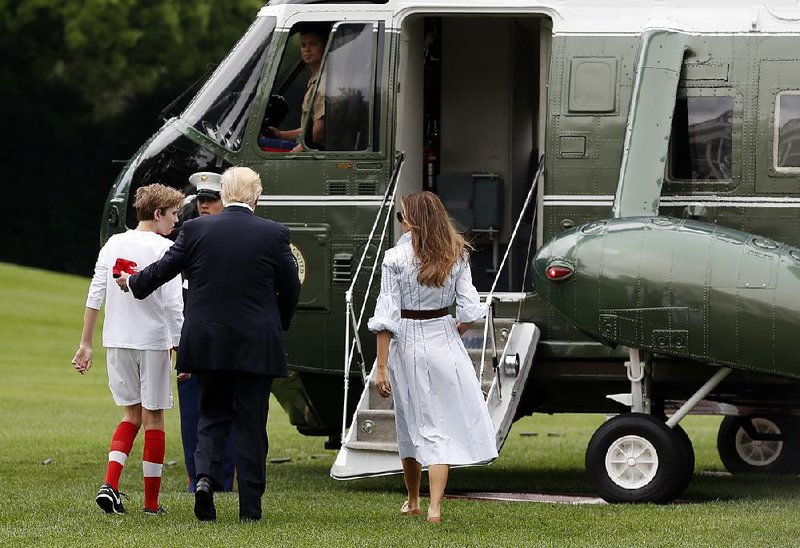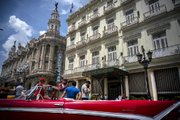HAVANA -- President Donald Trump's announcement of a tougher line toward Cuba has delighted hard-liners on the island, who say it reveals the long-held U.S. aim of imposing American will on Cuba and justifies their wariness toward Washington.
The president's speech in Miami also has dismayed moderates who were working with pro-engagement Americans but now fear that association with a policy of open hostility toward the communist system could make them targets for repression.
Trump and the Cuban-American Congress members who helped design the new policy pledged on Friday that it would block the flow of U.S. cash to military-linked enterprises and direct it toward independent businesses, with the long-term aim of overturning President Raul Castro's government.
Members of Cuba's small but vibrant independent civil society say they fear the new policy will do more harm than good.
[PRESIDENT TRUMP: Timeline, appointments, executive orders + guide to actions in first 100 days]
"Trump's become the independent business people's new enemy because -- even though he's said he wants to help entrepreneurs -- this new policy alienates entrepreneurs from the government," said Angel Rodriguez, a 27-year-old sociologist who works with the Catholic Church in entrepreneurship-training programs. "That could bring them under fire now, and they could find themselves much weaker."
Trump's new policy retains key aspects of former President Barack Obama's changes, leaving full embassies in Washington and Havana and letting U.S. cruises and airlines continue service to Cuba, although it will make travel harder by requiring most Americans to visit in groups and banning payments to military-linked businesses.
Obama's 2014 declaration of detente with Cuba prompted hundreds of islanders to start media, entrepreneurship and cultural projects that were outside the control of the state but within the bounds of law, unlike the directly confrontational tactics of Cuba's small dissident groups.
Some of those new groups faced intense pressure during detente, particularly after Obama's May 2016 visit to the island. Despite bitter criticism and personal attacks, most have continued to operate, many with a degree of support from U.S. individuals and foundations that would have been impossible before the re-establishment of diplomatic relations.
Many government officials and their supporters saw the Obama policy as an attempt to lull Cuba into complacency and undermine the foundations of a communist system based in part of near-total control of virtually every aspect of society, from animal-welfare groups to the film industry.
Trump's hostile language toward the Castro government and his literal onstage embrace of Cuban-American exiles and Cuban dissidents has unmasked the United States' true intentions toward Cuba and made it easier for the government to instill unity across Cuban society, pro-government figures said Saturday.
"Faced with your words, the Cuban people stand up and, their flag held high, sing their war anthem!" said a Facebook post by Jennifer Bello Martinez, the head of Cuba's official Federation of University Students and, at 25, the youngest member of the powerful Council of State.
"If I were the Cuban government I'd put Trump's speech up in schools. I'd transcribe it in the history books. I'd print a copy for every Cuban," said Iroel Sanchez, a pro-government columnist and blogger who was fiercely critical of Obama. "In less than an hour he showed Cubans how U.S. policy works ... The effect of this new policy will be strengthening the revolutionary leadership and seeing that it's right. This will galvanize things."
Among the few Cubans on the island who praised Trump was Berta Soler, a leader of the dissident group Ladies in White who said she was prevented by the government from flying to Miami to attend the speech in person.
"The Cuban regime will always find an excuse to blame the U.S. government," she said. "After detente, the people felt hopeful but there were no changes. The relationship must have conditions."
One of the most criticized, though tolerated, projects that has flourished since the declaration of detente is Cuba Posible, a think tank and online magazine dedicated to creating space for amicable dialogue about the future of Cuba. Its founders frequently travel overseas, including to conferences in the U.S.
"President Trump's policy makes itself, once again, part of the old policy of pressure and strangulation of the Cuban people," founders Lenier Gonzalez and Roberto Veiga wrote Saturday. "It's a continuation of old dynamics of confrontation that are immoral, unjust and illegitimate."
The Cuban government has given Trump's speech extensive coverage on official media outlets. A young state journalist who described himself as loyal to the government but eager to see faster, broader changes told The Associated Press that the government saw the speech as "the best course in anti-imperialism that could be given."
"This is the dream of the hard line here," the journalist said on condition of anonymity because he was not authorized to speak with the foreign press. "It's managed to unite the left and the center in Cuba."
first time at Camp David
Trump on Saturday flew for the first time to Camp David, the government-owned retreat in Maryland's Catoctin Mountains. A frequent weekend traveler, Trump has favored his own palatial properties in Florida and New Jersey over the wooded hideaway used by many presidents for a break from Washington.
Nearly five months into his presidency, it's Trump's first visit to a frequent destination for many of his predecessors.
Trump's wife, Melania; their son Barron; and the first lady's parents, Viktor and Amalija Knavs, joined the president for the overnight at Camp David. Trump was to return to the White House today.
Trump's departure was pushed back about an hour on Saturday, prompting some speculation that he was having second thoughts about the trip. Aides said the delay was weather-related.
Trump has spent more weekends away from Washington than not. Early in his presidency, he favored his palatial Mar-a-Lago estate in Palm Beach, Fla., which aides dubbed the "Winter White House." The club closed for the season last month, so more recently, he's been inclined to head to his golf club in Bedminster, N.J., which some have dubbed "Camp David North."
It's not terribly surprising that Trump has eschewed the real Camp David, which is near Thurmont, Md., about 60 miles northwest of Washington.
"Camp David is very rustic, it's nice, you'd like it," Trump said in an interview with a European journalist just before taking office. "You know how long you'd like it? For about 30 minutes."
White House staff members said little Saturday about what Trump plans to do at the Navy-run facility. The White House advertised no public events over the weekend, and aides said senior staff members were not joining the president.
Protected by the Marines as part of the Navy budget, Camp David has been utilized more by some presidents than others. By this point in their presidencies, Obama had visited four times, George W. Bush 11 times and Bill Clinton twice, according to CBS News' Mark Knoller, who tracks presidential travel.
Trump's getaways to Florida and New Jersey have both drawn a cascade of reports about the additional security costs for taxpayers and surrounding communities. Camp David, by contrast, has been secured for decades.
Information for this article was contributed by Michael Weissenstein, Andrea Rodriguez and Catherine Lucey of The Associated Press and by John Wagner and Michael Rosenwald of The Washington Post.
A Section on 06/18/2017

